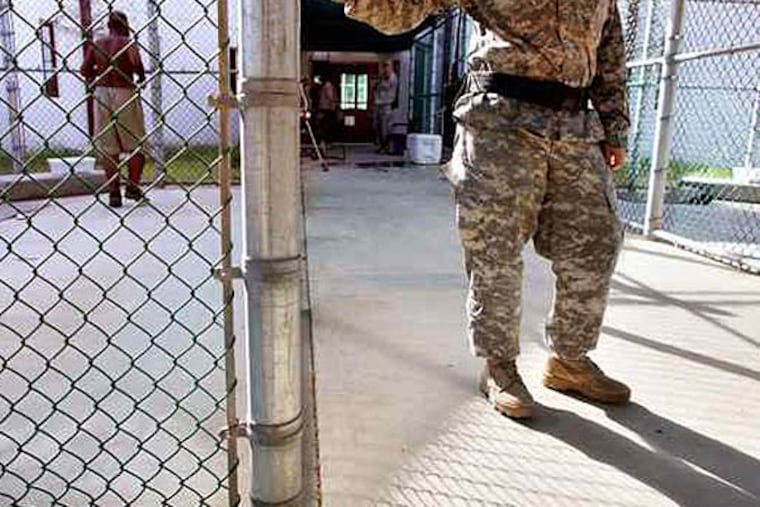Annual cost to hold a Guantanamo prisoner: $1 million per

President Obama is renewing his efforts to close the Guantanamo prison over congressional objections, even though the Pentagon is asking for more money to maintain it.
The whole Guantanamo issue is complex and far from settled. On Thursday, the president made a new push to close the prison, where a majority of its residents are on a hunger strike.
But on Tuesday, the AP said the Defense Department wants $450 million to spend over an 8- to 10-year period to upgrade and maintain the prison. (The Pentagon is part of Obama's executive branch.)
Congress, of course, will need to approve the request as part of the overall budget process.
By some estimates, it costs about $800,000 a year to maintain each prisoner at Guantanamo. President Obama put that number at closer to $1 million per prisoner in his speech on Thursday.
Currently, about 100 of the 166 prisoners there are on a hunger strike, with about 20 being force-fed by guards.
Outside the U.S., the costs extend beyond dollars—a point President Obama made in April when he indicated another effort will be made to close the prison and move (or release) its current inmates.
"Guantanamo is not necessary to keep America safe," Obama said at a White House press conference last month. "It is expensive. It is inefficient. It hurts us in terms of our international standing. It lessens cooperation with our allies on counterterrorism efforts. It is a recruitment tool for extremists. It needs to be closed."
The president in April also addressed some of the legalities of keeping people indefinitely at Guantanamo.
"The notion that we're going to continue to keep over 100 individuals in a no-man's land in perpetuity," he said, "the idea that we would still maintain forever a group of individuals who have not been tried—that is contrary to who we are, it is contrary to our interests, and it needs to stop."
But a majority of Americans still approve of the prison, according to recent polls. A Fox News poll this week says 62 percent of people want the prison to remain open as a facility to maintain suspects. A Huffington Post poll put that number at 54 percent in early May, while a Washington Post poll last year had the number closer to 70 percent.
And that includes a bipartisan majority within Congress, which has blocked past efforts by Obama to shutter Guantanamo.
Ultimately under the Constitution, Congress holds the purse strings for Guantanamo.
Lawmakers have made sure budgetary provisions prevent funding for the transfer of prisoners to facilities in the mainland United States, or money to pay for trials at Guantanamo.
At least half of the current 166 prisoners could be released under certain circumstances, if their countries would take them back and guarantee that tabs are kept on them. On Thursday, President Obama said he would lift a moratorium on detainee transfers to Yemen, to be reviewed on a case-by case-basis.
But there are concerns the released detainees could resume anti-American activities. One U.S. government study said that 16 percent of released detainees re-engaged in terrorist activities or associated with terrorists.
Peter Bergen, the director of National Security Studies at the New America Foundation, said in a recent CNN article that his foundation's review of news articles came up with a number close to 3 percent for released detainees who took part in terrorism; another 3.5 percent were suspected of terrorism.
For the other 80 prisoners, they will most likely have to go through a court system of some type, or be released.
Some top Democrats want to join forces with President Obama to close the prison.
Representative Adam Smith of Washington, a top Democrat on the House Armed Services Committee, said on Tuesday that Guantanamo will "continue to symbolize an unjust attempt to avoid the rule of law and to undermine the United States' moral standing in defending its values and protecting human rights."
But many Congress members share deep concerns about national security issues and the transfer of prisoners to U.S. soil.
A longer-term issue is the idea of some type of due process for the detainees who have been held indefinitely and may go before a review board. That process could still happen at Guantanamo or at a domestic U.S. prison—or not at all in some cases, which brings up a whole set of constitutional issues.
On Thursday, President Obama said, "We will insist that judicial review be available for every detainee." But he also acknowledged there wasn't a current solution for detainees who "we know have participated in dangerous plots or attacks, but who cannot be prosecuted—for example because the evidence against them has been compromised or is inadmissible in a court of law."
The president said, "I am confident that this legacy problem can be resolved, consistent with our commitment to the rule of law." But he didn't offer specifics.
The National Constitution Center in Philadelphia is a hands-on museum, national town hall, and civic education headquarters celebrating the United States Constitution and the story of "We the People." Learn more at constitutioncenter.org